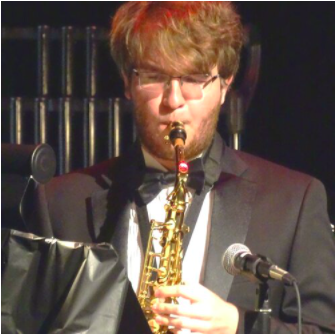Today we have the opportunity to share another installment in our “Instructor Features” blog series! This week we have Chris Carner to celebrate! Chris is a saxophone, voice, guitar, and bass instructor. Chris has experience with a variety of musical genres from vocal and orchestral music to jazz and rock, and he is passionate about helping his students achieve the best possible tone.
Read more about Chris below, and at the link near the bottom of the post.
To begin, what do you teach at Vibe and how old are your students?
I teach a few different instruments. Saxophone and voice are my main two, but I also teach guitar and bass, and my students range pretty widely. I mostly have younger students from four-years-old to a sophomore in high school.
What is your favorite concept or skill to teach?
I really like working on tone building. Anyone can learn to put down fingers quickly or do acrobatic stuff with their voice, but getting a good tone or sound is something that I think people don’t focus on enough, and that’s really what I enjoy doing—getting that good tone right off the bat and then we can work on technique later.
Talk about your background in music, all the way from your very first experience with an instrument.
When I was seven or eight, my mom wanted me to learn piano very, very badly, so she signed me up for lessons. And I hated it—every second of it. It felt very forced, like I didn’t have a choice, so I just resented doing it. But then when I was in 6th grade, I got the chance to join our junior high band, and I picked the saxophone. I thought it was a really cool instrument—it had a really cool sound. I wasn’t amazing at it starting out, but I practiced at it and got very competitive with a couple of my classmates, which was good because we pushed each other to keep getting better and better. Then I got up to high school and started marching band, and at that time, I joined the men’s singing ensemble and eventually the choir, which is where I got into singing. While all of that was going on, I somehow found time to join a garage band where they picked me up as their as their bass player. I had never played bass before, but it was pretty simple to pick up, and at the same time, I started teaching myself guitar. Then I went on to college at the University of Evansville, played in jazz bands and orchestras, and sang with the choir. Since then, I’ve moved up to Indy to start teaching and to look for more opportunities to find ensembles to play and sing with.
When you begin lessons with a beginning player, what are some initial goals you help create with the student?
The first thing I do is talk with them on the phone before the lesson begins and try to get a background of what their music history is like so I can know what terminology I can use and what terminology I need to teach. For the younger students, I work on just the concept of note names, but if they’ve been singing for a couple of years I can talk about chords, harmonies, and all that fun stuff. Past that, it kind of depends. How they hold their instrument is a big thing. A lot of my guitar students flip the guitar so they can see the strings, but that creates a lot of tension in their hands, so we try to break that habit very quickly. Otherwise, it varies student to student, but working on correct tone and good holding of the instrument is always the place to start.
Do you remember the first time that you “fell in love” with music?
Some of the earliest had to have been just while riding in the car with my mom. She had all these great 80’s hair band CDs like Foreigner, Boston, Aerosmith—all of these great classic bands. I remember thinking, “That’s a lot of fun. I’d love to see these guys and maybe even do what they do someday.”
What is your all-time favorite performing experience?
When I was in high school, I got the opportunity to go to New York and sing Christopher Tin song cycle. Just being up there with the full orchestra and around 200 other choir members singing this thing we had rehearsed for months was absolutely incredible.
You are the newest addition to a crayon box. What color are you and why?
I would be one of the shades of blue. If you color a landscape, you always have to have blue for sky, and just to be part of something that big—to be needed—feels really good.
Why do you feel that music education is important for developing members of society?
Music takes a lot of different pieces from different subjects and blends them all together. You’ve got math in counting notes, you’ve got physics in sound waves, and art obviously. There’s also a very subjective side, and so learning about music really rounds you out intellectually. Which, being smart and well-versed in knowledge going out into the world is a very important thing.
Chris is such a great addition to our team, and we are so excited to have him on board! Read more about him here!






